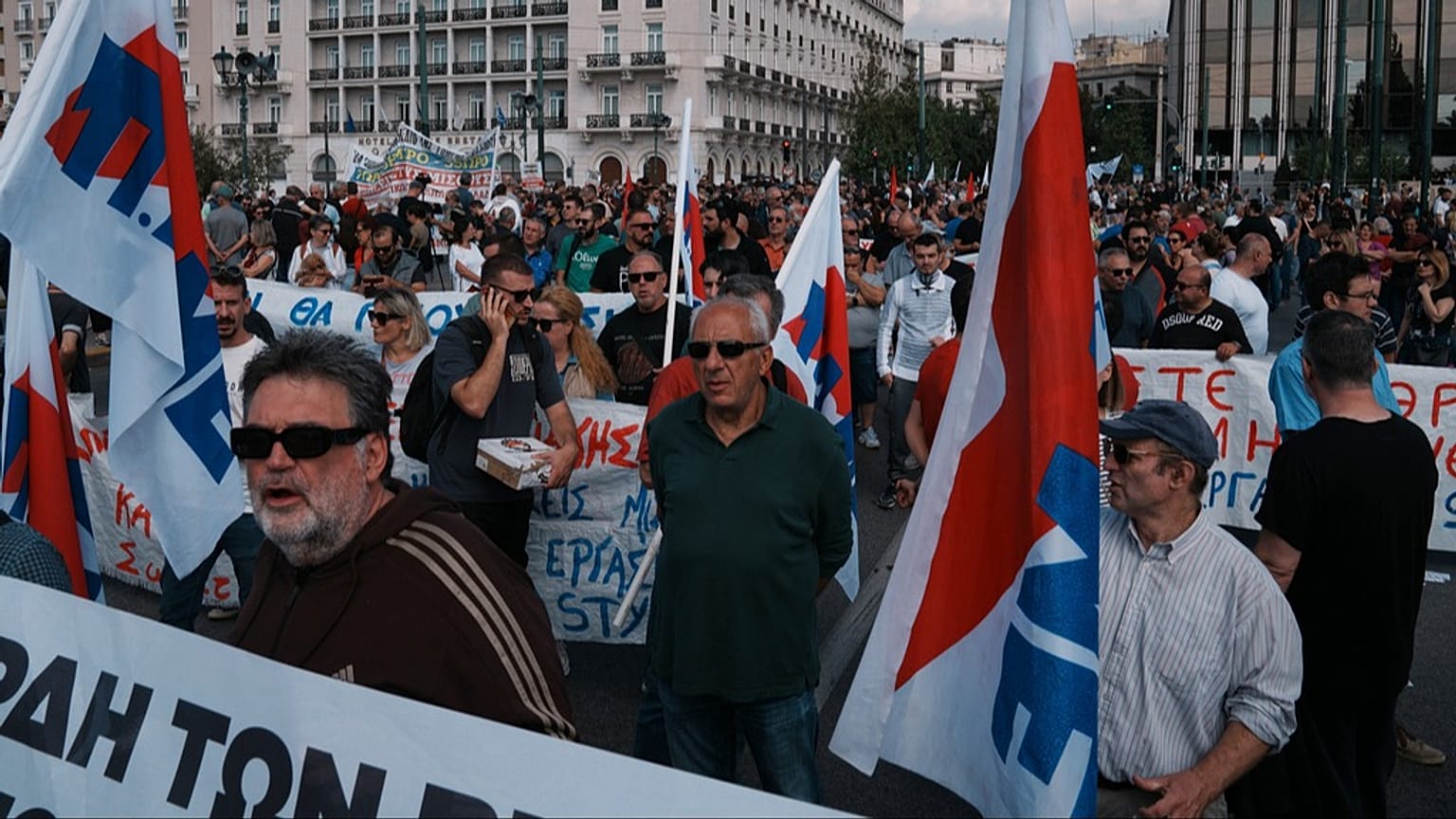Public and Private Sector Unite in Mass Walkout
Greece came to a standstill on Wednesday as hundreds of thousands of workers from both the public and private sectors launched a nationwide 24-hour strike. The coordinated walkout was organized in protest against government plans to extend the maximum working day to 13 hours.
The strike disrupted key services across the country. Trains, ferries, and taxis were completely suspended, while Athens buses and metro lines ran on limited schedules. Schools, hospitals, and government offices also shut their doors, leaving daily life across Greece paralyzed.
Major demonstrations took place in central Athens and Thessaloniki, with thousands of protesters filling the streets, carrying banners, and chanting slogans against the proposed labor reforms.
Trade Unions Lead Opposition

The strike was spearheaded by Greece’s two largest trade union federations: GSEE, representing about 2.5 million private sector workers, and ADEDY, representing civil servants.
Union leaders argue that the government’s proposed labor legislation threatens workers’ rights, undermines work-life balance, and risks pushing employees into dangerous levels of exhaustion.
Instead, unions are campaigning for a 37.5-hour working week, a standard already applied in many European Union countries.
What the New Labor Law Proposes

The government’s controversial reform would allow employers to require staff to work up to 13 hours per day for a single employer. At present, such extended hours are only permitted for workers juggling multiple jobs.
Key details of the proposal include:
-
A weekly cap of 48 hours, including overtime.
-
Up to 150 hours of overtime permitted annually.
-
Extended hours allowed for a maximum of 37 days per year.
-
40% overtime pay for employees working longer shifts.
-
Legal protection for workers who refuse overtime, ensuring they cannot be dismissed for non-compliance.
Labor Minister Niki Kerameos defended the plan, arguing that it introduces greater flexibility into Greece’s labor market while guaranteeing workers extra pay and legal safeguards. “This is about choice and flexibility, not exploitation,” she said.
Worker Concerns and Rising Tensions
Despite the government’s assurances, workers remain deeply skeptical. Many fear that once introduced, extended working hours will become the norm rather than the exception.
“Workers will lose any sense of private life. This law only serves employers’ profits while leaving us exhausted,” said Notis Skouras, a member of the Athens hairdressers’ union.
Protesters warn that the policy could intensify already high levels of stress, fatigue, and job insecurity, especially in industries with demanding physical and mental workloads.
Greece’s Economic Backdrop
The unrest comes at a time when Greece is still recovering from its severe 2009–2018 debt crisis, which forced the government to implement strict austerity measures, slash pensions, and cut wages.
Although the economy grew by 2.3% in 2024 and unemployment has fallen, living standards remain a concern. The national minimum wage is €880 ($1,031) per month, well below the cost of living in many urban areas.
According to Eurostat data, Greeks already work 39.8 hours per week on average, compared to the EU average of 35.8 hours. This makes the proposed reform especially unpopular, as workers fear it would further push Greece above European labor norms.
Previous Reforms Under Fire
This is not the first time Prime Minister Kyriakos Mitsotakis’s conservative government has clashed with labor unions. In July 2024, the administration approved a reform allowing a six-day work week in certain sectors, sparking widespread criticism.
The 13-hour workday bill is expected to be formally submitted to parliament later this month. Analysts predict it will face intense debate, with unions vowing to escalate protests if the measure passes.
Nationwide Response and What’s Next
The strike drew massive participation from workers across industries, demonstrating the depth of opposition. Demonstrations were largely peaceful, but tensions ran high as protesters accused the government of “rolling back decades of labor rights.”
Unions have warned that Wednesday’s strike was only the beginning. If the government pushes forward, more nationwide walkouts and mass demonstrations are expected in the coming weeks.
For now, Greece stands at a crossroads—between government efforts to modernize the labor market and workers’ demands for fair conditions and a sustainable work-life balance.

